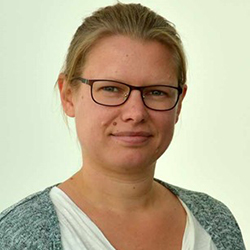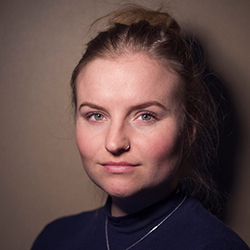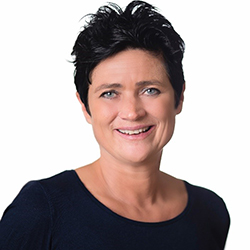
Erik Blennow, Dr med. vet., leg., psykolog vid Skånes universitetssjukhus, Vårdenhet Rehabiliteringsmedicin, Lunds universitet
Neuropsykologi efter hjärtstopp – därför behövs vår profession
Forskningen om hjärtstopp har traditionellt varit inriktad på att minska den höga dödligheten. I takt med att fler överlever och riskerar kognitiv nedsättning på grund av hjärnskada har fältet ”science of cardiac arrest survivorship” vuxit fram. Föreläsningen tar avstamp i rådande europeiska riktlinjer och går igenom varför neuropsykologer kan ha en viktig roll att spela i omhändertagandet av hjärtstoppsöverlevare. Forskningen som belyses fokuserar på val av neuropsykologiska tester i möte med vuxna patienter, men också sambanden mellan kognition, övergripande funktionsnivå, fatigue och depressiva symtom.

Dana Boering, Secretary General of the European Federation for Neurorehabilitation and Chair of the Special Interest Group on Motivation in Neurorehabilitation of the WFNR.
Adressing motivation to foster recovery after acute brain lesion
Current literature increasingly considers motivation as a long time eluded, yet very important aspect of rehabilitation and there is a growing body of literature emphasizing neurobiological, psychological, and clinical issues of patient motivation during neurorehabilitation after stroke. Nevertheless there is only a scarce interconnection and transfer between the various fields: neurobiology of motivation, psychology of motivation, the role of behavioral or pharmacological manipulation on motivation, disentangling motivation from other volitional and emotional disturbances after acute brain injury.
The talk will intent to build a framework for a comprehensive transdisciplinary motivation enhancing approach in neurorehabilitation and give a conceptual draft stressing motivation assessment and motivation increasing tools in day by day clinical practice.
Dana Boering is a German neurologist with over 30 years of expertise in the field of neurorehabilitation, for the most part working as Assistant Medical Director under the leadership of Professor Hömberg, across two different clinics.
Main field of interest was early rehabilitation, with emphasis on disorders of consciousness and the management in the subacute phase after severe TBI as well as spasticity management. A constant issue was moreover recovery after stroke, focusing on a specific concept of impairment oriented training, as well as the assessment and management of motivational disorders after acquired brain injury.
Research work with the Neurological Department of the University of Essen, focused on the role of the cerebellum in motor recovery after stroke as well as with the Coma Science Group in Liege, Belgium, working on the assessment of nociception in patients with disorders of consciousness.
Currently working as Secretary General of the European Federation for Neurorehabilitation and Chair of the Special Interest Group on Motivation in Neurorehabilitation of the WFNR.

Anna Bäckström, Leg psykolog, Fil Dr, Institutionen för psykologi, Umeå universitet
Utveckling av motorisk planering hos barn med autism
Presentationen handlar om hur barn, med eller utan utvecklingsrelaterade svårigheter, planerar målinriktade handlingar och hur detta både påverkar och påverkas av hur vi tar in omvärldsintryck via våra sinnen. Utgångspunkten för presentationen kommer från mitt avhandlingsarbete om motorisk planering hos barn som följer en typisk utveckling och utveckling hos barn med autism.

Kirk Erickson, Ph.D. Director, Translational Neuroscience, AdventHealth, Orlando, FL. Mardian J. Blair Endowed Chair of Neuroscience, AdventHealth, Orlando, FL, Research Professor, Department of Psychology, University of Pittsburgh
Effects of exercise and fitness on brain and cognition
In this talk I will describe the impact of physical activity on brain health and will discuss several methodological considerations for explaining heterogeneity and muddiness in the scientific literature. I will also focus on recent research findings on exercise and brain health in late adulthood and will discuss the evidence for several levels of mechanisms and moderators of these effects. Overall, engaging in regular exercise is an important modifiable lifestyle factor that carries significant consequences for learning, memory, and brain health in late adulthood.

Mattias Hedlund, Umeå universitet
Varför är det så viktigt med lagom hela tiden? - Autonoma, immunologiska och molekylära effekter av träning på hjärnans funktion och hälsa
Under föreläsningen kommer Mattias att beröra hur doserad fysisk träning påverkar kroppen genom autonoma, immunologiska och molekylära processer, med särskilt fokus på dysautonomi och dess koppling till mående och hälsa.
Föreläsningen belyser omedelbara och långsiktiga effekter av träning på hjärnans funktion och hur fysisk aktivitet påverkar hjärnan genom autonoma och immunologiska mekanismer, till exempel genom så kallade myokiner. Genom aktuell forskning och konkreta exempel från egen forskning och klinisk erfarenhet presenteras hur balanserad fysisk träning kan vara ett viktigt inslag i rehabilitering för många tillstånd och diagnosgrupper.
Mattias Hedlund är lektor i fysioterapi vid Umeå Universitet och arbetar kliniskt vid Neurorehabiliteringen, Norrlands universitetssjukhus.

Marika Möller, Adjungerad Lektor, Docent, Kliniska vetenskaper, Danderyds sjukhus, Karolinska Institutet
Symptomutveckling, neuropsykologiska funktioner och neuronala korrelat vid postcovidtillstånd – resultat från postcovidstudien på Danderyds sjukhus
I studien har över 100 patienter genomgått en neuropsykologisk utredning och följts över tid avseende symptomutveckling. I en substudie har en mindre andel också genomgått funktionell magnetkameraundersökning samt utretts av neuro-optiker. Resultat från huvudstudien samt preliminära resultat från substudien kommer att redovisas.

Sofi Sandstrom, Doktorand, Institutionen för diagnostik och intervention, Umeå universitet
Underliggande mekanismer i träningsinducerade förändringar på den åldrande hjärnan
Normalt, ”icke-patologiskt” åldrande är förknippat med en försämring i många kognitiva funktioner vilket över tid medför svårigheter att upprätthålla en välfungerande vardag. Fysisk träning är en intervention med potential att till viss del bromsa denna nedåtgående trend, men stödet för träningseffekter på kognition är blandat, och de underliggande mekanismerna vid positiva förändringar är mindre utforskade. Min forskning utgår från en randomiserad kontrollerad studie på personer över 65 och jag använder mig av kognitiva tester, MRI, funktionell MRI, blodmarkörer, samt en rad fysiologiska utfallsvariabler för att försöka bättre förstå de underliggande mekanismerna som medför en förändring på kognition som följd av träning. Min föreläsning kommer att ge dig en bild av det aktuella evidensläget i området, introducera dig till några grundläggande koncept inom träningsfysiologi, beskriva hur vi brukar mäta olika slags utfall på hjärnan samt presentera några av mina forskningsresultat för att illustrera hur forskning inom fältet kan se ut.

Sanne Schagen, Professor, Psychology, University of Amsterdam, the Netherlands
Cognitive impairment in non-CNS cancer patients
Patients with central nervous system (CNS) malignancies almost universally experience cognitive impairment during the course of their disease. Over the years, it has become clear that patients with non-CNS malignancies can also experience cognitive impairment, although this is less common and tends to be milder. This presentation will review the current understanding of the prevalence and nature of cognitive impairment in non-CNS cancers, explore the underlying mechanisms, and discuss strategies to prevent or mitigate these effects.
Sanne Schagen is Professor, Psychology, University of Amsterdam. She is chair of the Dutch Neuropsychology Society and group leader and head of the Division of the Psychosocial Research and Epidemiology at the Netherlands Cancer Institute,

Audrey van der Meer, Professor i neuropsykologi, Institutt for psykologi, Norges teknisk-naturvitenskapelige universitet (NTNU)
Why do we remember things better when we write them down by hand?
To write by hand, to type, or to draw – which of these strategies is the most efficient for optimal learning in the classroom? Our brain research shows that children, from an early age, must be exposed to handwriting and drawing activities in school to establish the neuronal oscillation and connectivity patterns that are beneficial for learning. We conclude that because of the benefits of sensory-motor integration due to the larger involvement of the senses as well as fine and precisely controlled hand movements when writing by hand and when drawing, it is vital to maintain both activities in a learning environment to facilitate and optimize learning.
Bild i sidhuvud: Patrik Jonasson